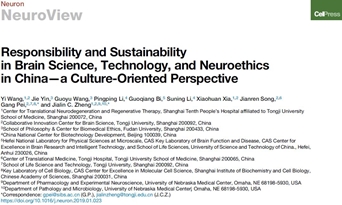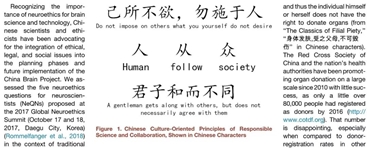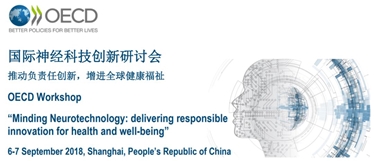In China, about one fifth of people suffer from chronic neurodegenerative diseases or neuropsychiatric disorders, which brings huge social and economic burden. China Brain Project is put forward under this background. In the two important documents, namely, The 13th Five-Year Plan (2016-2020) and The Scientific And Technological Innovation 2030, to develop China's brain plan is pinpointed, whose objectives are to reveal the neural basis of brain cognition, to develop early diagnosis and treatment methods of brain diseases, and brain stimulation intelligence technology.
China's Brain Program will focus on three neurological and psychiatric diseases: autism in children, depression in adults, and Alzheimer's disease (AD) in the elderly. Because there are about 1 million autistic patients in China, and up to 6% of the people in the city have severe depression (half of the patients diagnosed have ever had suicidal behaviors or suicidal ideation in their lifetime). In addition, according to the National Bureau of statistics, in 2014, more than 15% of the population in China was over 60 years old. In view of the high incidence of AD among the elderly, it is urgent to solve a series of problems of AD.
In recent years, due to the urgent needs and the support of the government and the public, the cognitive development of brain and related technologies have been continuously innovated. However, with this rapid development, there are also legal, moral and social problems. If these problems cannot be properly solved, the achievements of neuroscience may be destroyed in the short term, and the social prosperity and human welfare will be affected in the long term. Therefore, one of the purposes of Brain Project is to solve the ethical problems in the field of neuroscience.
On February 7, 2019, Zheng Jialin (president of TUSM) and Pei Gang, academician of Chinese Academy of Sciences, published an “viewpoint” article entitled "Responsibility And Sustainability In Brain Science, Technology, And Neuroethics In China - a Culture-oriented Perspective" , in which ethical issues in neuroscience are discussed combining Chinese Confucian culture and contemporary thinking.

As is quoted in the Analects of Confucius, “do not impose on others what you yourself do not desire “. Brain Project is in duty bound to make every effort to avoid any potential harm to individuals and society. In this regard, the researchers made further discussion on the five neuroethics issues raised at the 2017 Global Neuroethics Summit held in South Korea. Combined with traditional Chinese culture, and corresponding solutions ( the opinions and suggestions in this paper are from scientists and ethicists, not on behalf of the official position of the Chinese government) are put forward.

Question 1: Independent Personality
Under Neuroethics
China has five thousand years
of continuous history and culture, breeding a unique Chinese characteristics, which
embodies "the power of the masses". The Chinese idiom "two persons
makes a pair, many people constitute public" emphasizes the collective
power. Under this guidance, in order to achieve common goals, personal value
may be suppressed, and even personal personality may be ignored in extreme
cases. It also partly explains why personal privacy and something personal have
always been underestimated. Therefore, we need to pay attention to the above
problems in the future.
Question 2: Organ Donation
The development of Brain
Project is inseparable from “brain”, which comes from
the donation of normal person and patients. Affected by the thought of
"our body, skin and hair, which are bestowed from our parents, should never
be damaged", organ donation has always been a difficult problem. Though
the Red Cross Society of China and the national hygiene departments have been
promoting donation on a large scale since 2010, it proved of little avail.
According to the statistics of the Red Cross Society in 2016, there are only 80,000
registered organ donors in China (http://www.cotdf.org), which is far lower
than in other countries (as of 2016, there are 130 million registrants in the
United States ). However, in the future, China will have new measures to
encourage organ donation, which is worth expecting.
Question 3: Stigmatization Of Psychoses
One of the goals of Brain
Project is to develop early screening of psychoses. However, due to the
stigmatization, the population in early screening will passively labeled as
potential "be discriminated". For example, in 2018, 15 autistic
families in Shenzhen wanted to find shelter in public rental housing, but the
owners put up banners for protest.
Solution 1: Ensure Compliance
With International Ethical Standards For Neuroscience Research
In order to avoid inhumane
research, to ensure the safety and effectiveness and to prevent adverse research
consequences and impacts, we must abide by ethical standards. However, at
present, there is a lack of special ethical standards concerning human nervous
system and artificial intelligence-related neuroscience research in China. It
will be beneficial for us to improve our moral system, give more respect for
personal privacy and personality by abiding by international ethical standards,
learning from the advanced experience of other countries, increasing exchanges
in ethical fields and intensifying ethical supervision. In addition, some
specific operable procedures and methods are also put forward in the article.
Solution 2: Strengthening
Public Education And Training
Establishing a simple and quick
registration platform and optimizing the donation process will help organ
donation. In addition, more inclusive thinking of the younger generation will
also promote organ donation. The popularization of mental health knowledge and
the expansion of multimedia publicity channels will help to raise public awareness
and solve the problem of "stigmatization of mental diseases".
As is mentioned earlier, it
may be very difficult to build brain bank in China because of the conflict
between traditional filial piety culture and organ donation. The public
activities to promote organ donation started in 2010 were very limited before
2016. However, the turning point occurred in December 2016 when China's Organ
Transplant Development Foundation (COTDF) began working with Alipay to provide
direct organ donation registration services. Luckily, the first day of opening
was a huge success: more than 3,000 new organ donors were registered within 12
hours.

Source:http://www.sixthtone.com/news/1729/alipay-organ-donation-just-few-taps-away
Therefore, the fast and simple
registration of Alipay reduces the threshold of potential donors. Before that,
donors had to answer more than 20 questions for successful registration. Huang
Jiefu, head of COTDF, said he is afraid that every additional problem would
drive away 1 million potential donors. As of the end of 2017, the number of
registered donors exceeded 350,000, of which 280, 000 get registered through
Love&Hope. In addition, we also
note the powerful capacity of Wechat promotion for the easiness of 100,000 +
post.
Prospects
China's unique history and
culture has brought special attention to the development of brain science in
this country. Therefore, in the future, we need to show more respect for
personal privacy and some individualized Independents, abandon the idea of
"our body, skin and hair, which are bestowed from our parents, should never
be damaged" in traditional filial piety culture. We should also respect those
special psychiatric patients instead of discriminating them as great
scourges.
Due to the lack of neuroethics-related
professional knowledge in China, it is indispensable to learn from the
international community. Last year, an International Symposium On Neuroscience
Innovation was held in Shanghai, on which experts from the government,
academia, industry and private foundations exchanged views on moral and legal
issues. In the future, we will also take an active part in the international
dialogue on neuroethics.

International Symposium On Neuroscience Innovation Held In China
Meanwhile, we are also pleased
to share our thoughts and experiences among the international community,
especially in the case of cooperation between COTDF and Alipay in the promoting
organ donation in China.
As early as in 2015, Chinese
scientists conducted gene editing of human embryonic stem cells by using
crispr-cas9, which caused controversy worldwide. In 2018, "He Jiankui event"
shocked the whole scientific community and even the world. It urges us to
re-examine scientific ethics. Moreover, we also urge relevant regulatory
agencies to strengthen supervision.
"A gentleman gets along
with others, but does not necessarily agree with them". Different opinions
will help us to better understand the problem through exchange and discussion,
so as to better avoid the cases of touching ethical bottom line, and also make
our scientific research more rigorous and develop in a better direction.
In the future, Chinese
scientists and ethicists will work responsibly with experts from all over the
world to create a better future for the world.
Original link:https://www.cell.com/neuron/fulltext/S0896-6273(19)30050-9
References:
1. Poo, M.M., Du, J.L., Ip,
N.Y., Xiong, Z.Q., Xu, B., and Tan, T. (2016). China Brain Project: basic
neuroscience, brain diseases, and brain-inspired computing. Neuron 92, 591–596.
2. Wang Yi. et al. (2019).
Responsibility and Sustainability in Brain Science, Technology, and Neuroethics
in China—a Culture-Oriented
Perspective. Neuron.
